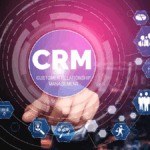In today’s fast-paced digital environment, modern enterprises demand efficient and scalable customer relationship management systems. Traditional on-premises CRM solutions are being rapidly replaced by cloud-based CRM software due to their flexibility, real-time access, and cost-efficiency. Cloud CRM empowers businesses to centralize data, streamline communication, improve customer service, and scale operations—all from a single platform accessible from anywhere.
In this article, we’ll explore the key features, benefits, and considerations when choosing the best cloud-based CRM software for your business.
What is Cloud-Based CRM?
Cloud-based CRM refers to customer relationship management software hosted on the cloud. This allows users to access customer data through the internet rather than using local servers or devices. The software is typically provided as a Software-as-a-Service (SaaS) solution, meaning updates, maintenance, and infrastructure are handled by the provider.
Why Enterprises Choose Cloud-Based CRM
Modern enterprises prefer cloud-based CRM for several compelling reasons:
1. Accessibility Anywhere, Anytime
With cloud hosting, team members can log in to the CRM system from any device, location, or time zone, enabling better collaboration among remote or global teams.
2. Scalability
Cloud CRM platforms can scale with the business—whether you’re managing 50 or 50,000 customers. You can easily add users or features as your enterprise grows.
3. Cost-Effectiveness
There’s no need for heavy upfront investments in infrastructure. Enterprises usually pay a monthly or annual subscription based on usage, which can be customized.
4. Data Security and Backups
Modern cloud CRMs employ strong encryption, automatic backups, and role-based access to keep enterprise data secure.
5. Real-Time Analytics and Reporting
Integrated dashboards and analytics tools offer insights into customer behavior, sales trends, and team performance.
Key Features of the Best Cloud CRM Software
When evaluating CRM software, modern enterprises should look for the following essential features:
1. Contact and Lead Management
Helps businesses organize, track, and nurture leads through the sales funnel efficiently.
2. Sales Automation
Streamlines repetitive sales tasks like follow-ups, appointment scheduling, and quotation management.
3. Marketing Integration
Enables email campaigns, social media tracking, and customer segmentation to enhance outreach strategies.
4. Customer Service Management
Manages support tickets, customer inquiries, and service requests across multiple channels.
5. Mobile CRM Access
A mobile-friendly interface ensures on-the-go access to customer data and interaction tracking.
6. Workflow Automation
Automates internal processes such as task assignment, status updates, and notifications to increase productivity.
7. Customization Options
Enterprises can customize workflows, fields, and modules to align with specific business requirements.
8. Third-Party Integrations
Seamless integrations with other tools like email platforms, project management apps, and communication tools are crucial.
9. AI and Predictive Analytics
Some CRMs offer AI-powered features that predict customer behavior and recommend next actions.
10. Collaboration Tools
Enables shared access to notes, emails, documents, and customer histories to encourage team synergy.
Benefits of Using Cloud-Based CRM for Enterprises
Improved Customer Retention
By maintaining a complete view of every customer interaction, enterprises can deliver personalized experiences that foster loyalty.
Increased Sales Productivity
Automation features help sales teams close deals faster and more efficiently, freeing up time for strategic initiatives.
Enhanced Data Accuracy
Cloud-based systems reduce manual data entry errors and ensure information is synced across departments.
Streamlined Communication
Shared access across departments promotes transparency and smoother collaboration.
Rapid Deployment
Cloud CRMs can be deployed quickly without the need for physical installations, helping enterprises get started with minimal delay.
Compliance Management
Most cloud CRM solutions comply with data privacy laws and offer tools to manage GDPR, HIPAA, and other regulations.
How to Choose the Right Cloud-Based CRM for Your Enterprise
Evaluate Business Needs
Identify the core challenges you’re trying to solve—be it lead management, customer service, or analytics.
Prioritize Scalability
Select a CRM solution that can grow with your business and support a growing number of users and data.
Consider Usability
A user-friendly interface reduces the learning curve and promotes user adoption.
Look for Customization
Ensure the CRM allows flexibility to adapt workflows, dashboards, and reporting features to your business needs.
Test Support and Onboarding
Check if the CRM vendor offers reliable customer support, onboarding resources, and training tools.
Review Data Security
Ensure the provider follows industry-standard encryption, access control, and data recovery practices.
Set a Budget
Estimate your monthly or annual cost and choose a plan that aligns with your financial capacity.
Use Cases of Cloud-Based CRM Across Industries
Technology Sector
Track long B2B sales cycles, manage demos, and nurture client relationships in the SaaS and tech space.
E-commerce
Use CRM for cart recovery campaigns, email marketing automation, and customer feedback tracking.
Healthcare
Manage patient relationships, appointment reminders, and service inquiries while maintaining compliance.
Education
Support student onboarding, enrollment follow-ups, and alumni engagement through CRM workflows.
Real Estate
CRM helps manage property listings, client interactions, and follow-ups for potential buyers and renters.
Manufacturing
Streamline distribution channels, handle dealer relationships, and automate order tracking.
Cloud CRM Trends in 2025 and Beyond
1. AI-Powered Recommendations
AI tools are being integrated into CRM platforms to suggest best times to contact leads and predict customer churn.
2. Voice and Chat Interfaces
Virtual assistants and AI bots enable users to manage tasks via voice or chat commands.
3. Deeper Personalization
CRM systems are using machine learning to personalize emails, dashboards, and offers based on user data.
4. 360-Degree Customer Views
Integration with marketing, sales, and support platforms provides a comprehensive view of customer interactions.
5. Low-Code Customization
Users can create custom workflows or modules without needing advanced coding skills.
6. Focus on Privacy
CRMs are placing a greater emphasis on data governance and user consent tracking to comply with global regulations.
Challenges with Cloud-Based CRM Adoption
Data Migration Complexities
Transferring existing customer data into the cloud may require cleaning, mapping, and validation.
Change Management
Getting teams to adapt to new processes and platforms can be difficult without proper training and communication.
Integration Hurdles
Enterprises may face compatibility issues when connecting CRM with legacy tools.
Dependence on Internet Connectivity
Since cloud CRMs are web-based, a stable internet connection is essential for uninterrupted access.
Conclusion
Cloud-based CRM software has become an indispensable tool for modern enterprises seeking to improve customer experiences, drive revenue, and foster operational efficiency. The right CRM solution should align with your enterprise’s goals, scale seamlessly, and offer robust features that empower your teams to perform at their best.
Whether you’re in sales, marketing, support, or operations, a cloud CRM brings structure, clarity, and strategic insight to your customer interactions. By focusing on usability, flexibility, and integration, your business can future-proof its customer engagement strategies and remain competitive in a data-driven world.
FAQs
What is the difference between on-premise and cloud-based CRM?
On-premise CRM is hosted locally on a company’s servers, while cloud-based CRM is accessed via the internet and hosted off-site by a provider.
Is cloud CRM secure for enterprise data?
Yes, most cloud CRM systems offer robust security features such as encryption, multi-factor authentication, and regular backups to protect enterprise data.
Can cloud CRM integrate with other business tools?
Yes, modern CRM platforms typically support integration with email platforms, accounting software, marketing tools, and other business systems.
Is training required for using cloud CRM?
While most cloud CRM platforms are user-friendly, onboarding sessions, tutorials, and documentation help teams get the most value from the system.
What industries benefit most from cloud-based CRM?
All industries can benefit, but it’s especially useful in technology, e-commerce, healthcare, real estate, education, and manufacturing due to their customer-centric nature.
Can small businesses use cloud CRM?
Absolutely. Cloud CRM solutions are scalable and offer pricing tiers suitable for businesses of all sizes.











